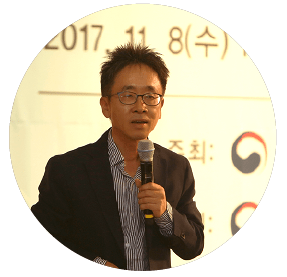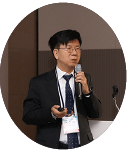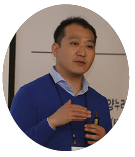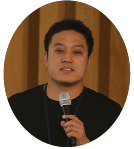
- Home
- About APB Forum
- APB Forum 2024
4th APB Forum, Fall 2017
Privacy by Design Across Border

Keynote Speech

A Case on International Cooperation Viewed through Personal Information Breach
in Hong Kong
- Stephen WONG (Privacy Commissioner for Personal Data, Hong Kong)
With the webcam hacking incident and the customer data leakage incident of VTech in Hong Kong, we realized the importance of global cooperation to solve issues regarding personal information breach. To protect victims whose hacked information had spread online as far as the UK, the PCPD Hong Kong requested the British government to ban monetary trade of webcam data to prevent exposure of privacy. In the case of VTech, leaked information of customers spread all around the world and the PCPD Hong Kong worked as a hub for sharing and delivering information about the case to each country to obtain cooperation for protection of personal data and implementation of new security policies.

Do Not Assume that Future Technology Will Bring Happiness to Us
- Eunkook SUH (Professor of Psychology, Yonsei University)
Technology has brought us a more comfortable, efficient, and safer life. So,
are we happier than ever? It is known that we feel happy when a “pleasure
light bulb” flickers in our brain. The pleasure light bulb flickers, for example,
when we eat delicious food or spend time with good people. A sense of social
belonging is one of the most basic desires for humans to feel happiness.
Then, how can science and technology satisfy our desire to feel this sense of
social belonging? Can the need for the sense of belonging be fulfilled through
online social network services? It is time for us to have a more thorough
discussion on ICTs and psychological happiness.Track A. Asia Privacy Bridge Forum

Evelyn GOH
(Communication Policy, PDPC, Singapore)
In the time of a rapidly changing digital economy, responsibilities between nations on privacy protection are becoming more important than ever. As the policies of each country on privacy protection are different, a bridge to connect them is needed. It is important to reinforce privacy protection and cooperative research for mutual benefits by sharing information and knowledge to develop a mechanism that can transfer data between countries.

Hyein SONG
(Korea Internet & Security Agency, South Korea)
It is necessary to build a regional privacy cooperation system using a multidimensional approach to establish effective privacy protection policies between countries. In the domestic/personal sector, KISA has conducted research on privacy in cooperation with academia and tried to reflect the result on policy development. The region/government sector aims to establish multidisciplinary cooperation between parties in terms of executing privacy protection law. In the global/government sector, we need to consider how to apply solutions that are derived through international discussions into domestic laws.

Takayuki KATO
(Asia University, Japan)
Japanese government has a regulation to limit international data transfer. Data generated in Japan can be transferred only to the countries where PIPC (Personal Information Protection Commission) sets the privacy protection level. This resembles the conformity assessment of the EU. However, there is still a need for further agreement among nations about the scope of the consent and the definition of data transfer across borders. Since international data transfer is more complicated than domestic transfer, the demand for proper assessment increases.

Sonny ZULHUDA
(Civil Law Department, Ahmad Ibrahim Kulliyyah of Laws, International Islamic University, Malaysia)
The judicial branches and assembly in Malaysia are actively discussing privacy. The Executive Committee is responsible for implementing enforcement regulations in two ways. One is by promoting the principles of industrial practice, and the other is through law enforcement and prosecution.
Indonesia does not have any clear regulations on this matter. There are few legal frameworks, but they are still in the pre-implementation phase. Enactment of major privacy protection laws will take longer time.
Beomsoo KIM
(Barun ICT Research Center, Yonsei University,
South Korea)
Korea will strive to continuously establish close cooperation between countries with the help of Privacy International Cooperation Center, APEC CBPRs, and the APB Forum. With the Privacy International Cooperation Center, we will conduct research on privacy protection regulations of foreign countries and support the people and enterprises of Korea. Through the participation of APEC CBPRs, we will support the establishment of privacy policies that are aligned with the APEC Privacy Framework. With APB Forum, we plan to improve privacy rights, such as redressing privacy, by understanding the diversity of privacy laws in Asian nations and building friendly relations with them.

Yanqing HONG
(Internet Development Research Institute,
Peking University, China)
If private information needs to be provided at the request of the operation of an institution, security evaluation must be carried out with the relevant department of State Council in accordance with measures enacted by the national Internet information department. If there is other regulation under the law, then that regulation takes precedence. Data that may cause harm to national and public interests through violation, loss, abuse, falsification, destruction, accumulation, merger, and analysis is considered as “important”.

Kwangbae PARK
(Lee & Ko, South Korea)
In the big data era, it is necessary to review the concept of generated information inferred from observed personal data. A legal basis to create and use such data must be established. The existing prior-consent framework needs to be revised and the legal terms related to a preliminary notice on
collection and use of the generated information must be added to the law. It is also important to discuss the necessity of supplementary provisions related to the data subject for inferred data.
Galbat LKHAGVAMAA
(Law Enforcement University of Mongolia,Mongolia)
Mongolia must take the following measures to strengthen the legal system for privacy protection.
First, research to develop privacy protection must be carried out. In addition, the privacy protection system must be improved to focus on data types and activities in the specific industries such as financial service, health and medical service, and communication. Special laws on privacy protection must also be enacted and each legal procedure must be supplemented to meet international
standards.
H.P.S. SHANTHA
(Ministry of Finance and Mass Media, Sri Lanka)
The people of Sri Lanka have low awareness on Privacy-related laws and legal rights. Self-regulated acts through behavior rules developed by the industrial circles are carried out as an alternative to government regulation. It is necessary to make an effort to implement data protection laws suggested by the EU Guidelines.
Track B. 4th Industrial Revolution and Change in Jobs

The future of artificial intelligence and its impact on jobs
by Tony LEE (Manager, NVIDIA)
Data scientists are becoming popular with the increased connection between devices and the development of artificial intelligence, machine learning, and deep learning. Data scientists analyze a massive volume of structured and unstructured data and provide analysis results according to the needs or purposes of client companies. An analysis report written by data scientists should be easy enough to be understood by the general public.

3D Printer, maker movement and the 4th Industrial Revolution
by San KO (CEO, ATEAM VENTURES Co, Ltd.)
ATEAM VENTURES, founded in September 2013, designed a new, high-quality 3D printer that can be easily used by anyone. Recently, it also launched “Shapeengine,” which is an online manufacturing platform. The goal of ATEAM VENTURES is to build an environment where people can use the factories and equipment as their own. In the era of the digital manufacturing revolution, through the democratization of manufacturing, anyone can become the main agent of production.

Drone industry and job prospects in the era of 4th Industrial Revolution
by Bosung LEE (Researcher, Korea Aerospace Research Institute, Unmanned Vehicle Advanced Research Center)
A drone is a prosumer-oriented product that combines the expertise of various fields, including hardware, software, communication, electronics, and machinery. Individuals or specialized companies of small scale have advantages over mass-production a drone will play active roles than
a single company focusing on mass production. The possibility of applying advanced technologies of the existing industry to a drone is expanding, and companies and producers that can accurately read the needs of consumers will succeed in the future. A market that prioritizes individual’s ability over the size of a business will be established.
Job issues and government responses in the era of 4th Industrial Revolution
by Pansik HWANG (Assistant Manager, Ministry of Science and ICT, Future HR Development Division)
Up to 47.9% of existing jobs will be replaced by automation due to job changes by the 4th Industrial Revolution, and about 80,000 new jobs in the field of intelligent information will be created by 2030. The possibility of automation within the same occupation group will be different according to duty. Job mismatching by field has been intensified, causing unemployment and manpower shortage at the same time. Jobs are scarce in simple repeated works, while occupations that require creative or professional competence suffer from a shortage of talent. In response to this, new promising jobs must be discovered, and technologies and knowledge required for these new jobs must be found. It is also necessary to foster the related industries by developing qualifications through new training and education programs.

ICT advancement and job changes
by Kang-shik CHOI (Professor, Department of Economics, Yonsei University)
The 4th Industrial Revolution can be characterized as destructive innovation and massive discontinuity, with overflowing anxiety similar to the 1st Industrial Revolution. However, there is also a positive view that artificial intelligence is just a tool, and advancement of new technologies will bring changes in the process of manufacturing. There are two types of jobs that will not be computerized: abstract jobs and service industries, such as security guards, cleaners, drivers, flight crew, food service workers, and home care aids. These
jobs will have an increase in employment due to developing technologies and complementary relations. However, repeated works such as production jobs, office jobs, and sales jobs will be computerized and replaced with technologies regardless of how complicated they are, which will lead to a gradual decrease in employment.Track C. Cyber-bullying & Internet Ethics

Internet use and family relations of cyberbullying victims
by Young-sam KOH (Professor, Tongmyong University)
17.2% of elementary/middle/high school students responded that they have experienced cyberbullying in the past year. Cyberbullying is a very serious problem for general netizens, including teenagers, but basic researches on the causes, progress, and results of cyberbullying are still insufficient.
As a result of investigating a correlation between use of Internet, cyberbullying, and family relations, the more people use Internet, the less the bond and closeness between family members are formed. Damages from cyberbullying are higher when the bond and closeness between family members are low. Involvement of parents, supervisors, or families on Internet use by teenagers can play a big role in preventing cyberbullying from anonymous online attackers.
The current condition of cyberbullying connected to school violence
by Seung Hye KIM (Head of Agency, Blue Tree Agency)
Studies on cyberbullying show that teenagers with higher digital literacy and higher usage of cohesive social media, such as Kakao Talk or Facebook, have more experiences with cyberbullying. Bonding with parents can reduce cyberbullying, and a free and open conversation with parents can reduce verbal violence via mobile phones.
To prevent and respond to cyberbullying, it is necessary to carry out activities such as expansion of cyber ethics, reinforcement of comprehensive media literacy education, invigoration of a self regulatory control system, encouragement of report and consultation related to cyberbullying, expansion of programs that can promote social interactions, supporting teenagers to solve
cyberbullying voluntarily, and training cyber mentors as peer coordinators.
Current status and counter measures of cyberbullying between teenagers
by Changho LEE (Senior Research Fellow, National Youth Policy Institute)
Cyberbullying events have significant negative impacts because the number of witnesses is higher than offline and traces of bullying remain longer in cyberspaces. Cyberbullying is distinct from traditional bullying that happens when a bully and a victim are physically in the same place, because it happens in online spaces based on anonymity, and therefore, people can act without restraints.
It is necessary to prepare countermeasures against cyberbullying such as strict punishment on the cyber bullies, training of cyber mentors, awareness on the seriousness of cyberbullying, and reinforcement of education for parents.
A new direction of Internet ethics education
by Cheung Moon CHO (Principal Researcher, National Information Society Agency)
The current education on Internet ethics is not systemic due to the lack of consent on its purpose and contents. Since it focuses on deviant behaviors, education on ethical online behaviors is still inadequate. Teaching methods are insufficient and impractical. Thus, it is important to suggest principles that are differentiated from general ethics education and provide learner-centered
education from the perspective that students are subjects that can think and form meanings.
A plant for Internet ethics education to cope with pleasure of Internet addiction and bullying
by Mi-sun YOON (Associate Researcher, Seoul Women’s University)
Activities for preventing/confronting cyberbullying are suggested as follows:
1) Expanding education on ethics of cyberspaces and reinforcing integrated media literacy education;
2) Invigorating a self-regulatory system;
3) Encouraging reporting and counseling related to cyberbullying;
4) Expanding programs for promoting social interactions, supporting teenagers to solve cyberbullying voluntarily, and training cyber mentors as peer coordinators;
5) Promoting moderate use of media and practice of cyber ethics;
6) Increasing cognitive empathy and cyber ethics, developing and implementing arbitration programs to increase the level of satisfaction in schools;
7) Enacting and implementing school regulations related to cyberbullying and arranging laws related
to school violence.Track D. Barun ICT Research Projects

Suicide in Korea – Analysis and prevention
by Sang Joon KIM (Professor, Yonsei Univ. Department of Political Science & International Studies)
The suicide rate in OECD countries other than Korea has been decreasing, while Korea particularly has a higher suicide rate. In the case of elders, a rapid decrease in ability to take care of personal affairs as they age causes depression.
The introduction of Telemedicine, a mobile and remote medical service, is recently being promoted to prevent suicide among the elderly. Specifically, through a community broadcasting system, a remote medical system, which relies on a Moving Care Unit and the local community (community building) is
carried out in high risk areas that need remote medical treatment.
Development of senior citizen classification system and key requirement research to suggest a direction of ICT service for the elderly
by Kyongmee CHUNG (Professor, Yonsei Univ. Department of Psychology)
It was difficult to understand service demands of the elderly because the previous studies focused on the specific group of the elderly instead of the entire population of the elderly. Therefore, the study classified the subgroups of the elderly using a multiaxial system and derived four service areas for the elderly. The three key services were pleasant life, intellectual life, and maintenance of relationships, but safe life was found as the main service area for elderly in their 80s. With regard to ICT services, most of the elderly complained about “difficulty of use” and it implies that the focus must be on easiness of use.

An empirical study on empowerment mechanism through learning by failures of other organizations
by Seung Hyun KIM (Professor, Yonsei Univ. School of Business)
Personal data leakage of enterprises is occurring every year and the breach rate of privacy protection is continuously increasing. Although it is important for hospitals to adopt EHRs to protect privacy of patients, systematic preparations against violation of medical information are still insufficient.
To prevent private information leaks that repeatedly occur, it is important to establish an active information-sharing system between organizations to create an environment where organizations can learn from the cases of other organizations related to personal data leakage.
Development of an indoor navigation system for visually impaired people
by Jin Bae PARK (Professor, Yonsei Univ. School of Electrical and Electronic Engineering)
People with visual impairment lead an active social life as ordinary people. White cane walk, which is a general way of walking for people with visual impairment, causes the frequency of getting lost on the first trip, and therefore, a device to guide the visually impaired is needed. Considering 71% of the visually impaired people are familiar with smartphone use, development of an indoor navigation system using CCTV and a smartphone is suggested.

Is smart environment integrating the society? Light and shadow of social integration in the digital era
by In Han SONG (Professor, Yonsei Univ. Graduate School of Social Welfare)
By 2015, half of the world population uses a smartphone, both a smartphone and SNS connect more people. However, social integration is inactive compared to such high usage of smartphones. It is necessary to investigate whether a connection between individuals via a smartphone accelerates or hinders social integration. The results of the study revealed that people engage in social integration and social conflicts at the same time through a smartphone. Social integration was mainly observed in the areas of voting and relations. Social conflicts are often expressed in the areas of politics and class.

Development of a capacity building model for adaptive smartphone use
by Sungman SHIN (Professor, Handong Univ. Counselling Psychology & Social Welfare)
Adaptive smartphone use means using a smartphone profitably by maximizing the advantages and minimizing the disadvantages of smartphone use. The EU is also carrying out capacity-building policies for Internet users to control the purpose and time of use, claiming “maximization of opportunities and minimization of risks.” With a model that applies the concept of a balanced
motive to adaptive smartphone use, it is possible to suggest a new perspective that can help teenagers to build ability to control themselves.
Health and medical values of online customer reviews on medicine
by Song Hee HONG (Professor, Seoul National Univ. College of Pharmacy)
Providing information to a patient can improve the intellectual level of the patient and lead to smooth communication with a doctor. Through this, the doctor can reflect on the information that is not revealed through clinical figures, symptoms that the patient feels, preferences of the patient, etc. to find the best treatment. In the case of the elderly, too many drugs are used and they cause
more side effects such as weakening of physical functions. Because participation of the elderly in clinical tests and treatment is low, providing medical information is even more important.
Accordingly, the need for an ICT system where consumers of medicine can voluntarily write and share their review is rising. It can contribute to enhancing the quality of life by increasing safety and efficiency of drug use through the medicine service customized for each patient, and it will also increase the understanding of patients who use the medicine by promoting communications among medicine users as well as between medicine users and medicine experts.
A study on development of smartphone stress index for satisfactory smartphone use by life stage
by Kihak LEE (Professor, Yonsei University, Department of Psychology)
The need for a healthy way of using smartphones is rising, as the number of people who are at the level of pathological addiction but have difficulties in controlling moderate use is increasing. For healthy use of smartphones, it is important to understand differences in the purpose and behavior of using smartphones according to age and life stage based on user experiences; differentiated experiences; and stress based on smartphone use. Accordingly, a psychological structure of stress factors for using a smartphone by life stage (adolescence, early stage/middle stage of adulthood) was investigated, and a stress index for using smartphones by life stage was developed.
Contact Us
Barun ICT Research Center
50 Yonsei-ro, Seodaemun-gu, Seoul 03722, Korea
Tel : +82-2-2123-6694
Email : barunict@






























